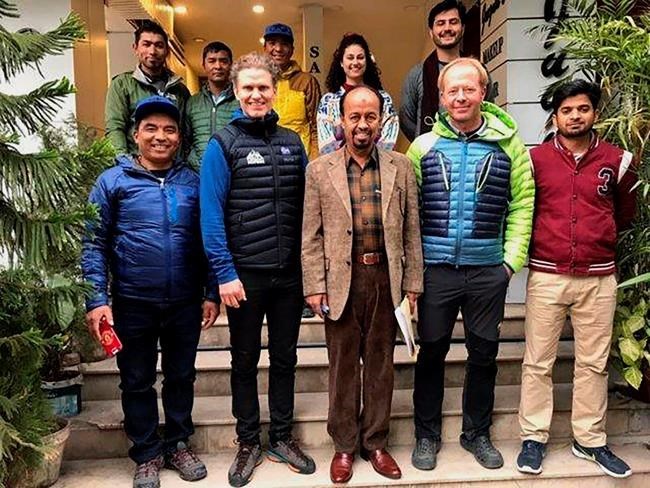
In this Jan. 8, 2020, photo provided by Alpine Club of Pakistan, Iceland's mountaineer John Snorri, second left in front row, and his team members pose for photograph with Karrar Haider, a top official of Alpine Club of Pakistan, center in front row, after a meeting, in Islamabad, Pakistan. An aerial search mission is on to find three experienced climbers, Ali Sadpara and his two companions, John Snorri and Juan Pablo Mohr, who lost contact with the base camp during their ascend on world's second top peak in northern Pakistan, official said Sunday, Feb. 7, 2021. (Alpine Club of Pakistan via AP)
Republished February 08, 2021 - 2:54 AM
Original Publication Date February 07, 2021 - 11:01 PM
ISLAMABAD - Bad weather on Monday forced Pakistani army helicopters to temporarily halt their search for three mountaineers who went missing while attempting to scale K2, the world’s second-highest mountain.
The search was stopped just hours after it resumed for the third consecutive day, with officials uncertain when weather conditions would improve enough for it to resume again. Friends and family of the three — Pakistani climber Ali Sadpara, John Snorri of Iceland and Juan Pablo Mohr of Chile — grew increasingly concerned for their fate in the harsh environment.
The three lost contact with base camp late on Friday and were reported missing on Saturday, after their support team stopped receiving communications from them during their ascent of the 8,611-meter (28,250-foot) high K2 — sometimes referred to as “killer mountain.”
Located in the Karakorum mountain range, K2 is one of the most dangerous climbs. Last month, a team of 10 Nepalese climbers made history by scaling the K2 for the first time in winter.
Waqas Johar, a district government administrator, said on Twitter that almost 60% of K2 was under clouds. The search and rescue team was unable to find any clue of the climbers' whereabouts so far, he said, adding it will attempt again once the weather improves.
Earlier, Sadpara’s son said in a video statement released to the media that the chances of the mountaineers' survival in the harsh winter conditions were extremely low. Sadpara, an experienced climber, had earlier scaled the world’s eight highest mountains, including the highest, Mount Everest in the Himalayas, and was attempting to climb K2 in winter.
“Miracles do happen and the hope for a miracle is still there,” said Karar Haideri, secretary at the Pakistan alpine Club. He said a statement from the authorities was expected later on Monday.
Sadpara's son Sajid Ali Sadpara, himself a mountaineer who was part of the expedition at the start but later returned to base camp after his oxygen regulator malfunctioned, said their chances after “spending two to three days in the winter at 8,000 (meters' altitude) are next to none."
The younger Sadpara praised the rescue and search efforts but said “as a climber, I know that ... only a miracle can save their lives.”
The younger Sadpara's oxygen regulator had malfunctioned when he reached K2's most dangerous point, known as Bottle Neck, earlier last week. There, he waited for his father and two other climbers for more than 20 hours but with no sign of them, he descended.
Since the climbers went missing, Iceland's foreign minister, Gudlaugur Thór Thórdarson, has spoken to his Pakistani counterpart, Shah Mahmood Qureshi, by telephone. According to Pakistan's foreign ministry, Qureshi assured him that Pakistan would spare no effort in the search for the missing mountaineers.
Although Mount Everest is 237 metres (777 feet) taller than K2, the K2 mountain is much farther north, on the border with China, and subject to worse weather conditions, according to mountaineering experts. A winter climb is particularly dangerous because of the unpredictable and rapid change in the weather.
Winter winds on K2 can blow at more than 200 kph (125 mph) and temperatures can drop to minus 60 degrees Celsius (minus 76 Fahrenheit). In one of the deadliest mountaineering accidents ever, 11 climbers died in a single day trying to scale K2 in 2008.
___
Associated Press writer Asim Tanveer in Multan, Pakistan, contributed to this story.
News from © The Associated Press, 2021